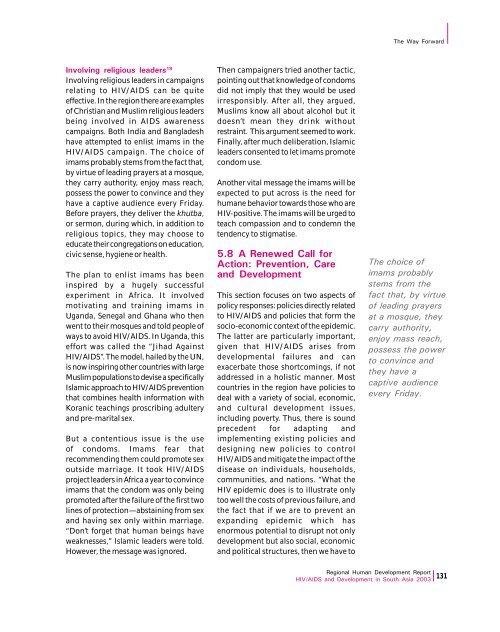Download Report - UNDP Asia-Pacific Regional Centre - United ...
Download Report - UNDP Asia-Pacific Regional Centre - United ...
Download Report - UNDP Asia-Pacific Regional Centre - United ...
You also want an ePaper? Increase the reach of your titles
YUMPU automatically turns print PDFs into web optimized ePapers that Google loves.
The Way orwardInvolving religious leaders 19Involving religious leaders in campaignsrelating to HIV/AIDS can be quiteeffective. In the region there are examplesof Christian and Muslim religious leadersbeing involved in AIDS awarenesscampaigns. Both India and Bangladeshhave attempted to enlist imams in theHIV/AIDS campaign. The choice ofimams probably stems from the fact that,by virtue of leading prayers at a mosque,they carry authority, enjoy mass reach,possess the power to convince and theyhave a captive audience every Friday.Before prayers, they deliver the khutba,or sermon, during which, in addition toreligious topics, they may choose toeducate their congregations on education,civic sense, hygiene or health.The plan to enlist imams has beeninspired by a hugely successfulexperiment in Africa. It involvedmotivating and training imams inUganda, Senegal and Ghana who thenwent to their mosques and told people ofways to avoid HIV/AIDS. In Uganda, thiseffort was called the “Jihad AgainstHIV/AIDS”. The model, hailed by the UN,is now inspiring other countries with largeMuslim populations to devise a specificallyIslamic approach to HIV/AIDS preventionthat combines health information withKoranic teachings proscribing adulteryand pre-marital sex.But a contentious issue is the useof condoms. Imams fear thatrecommending them could promote sexoutside marriage. It took HIV/AIDSproject leaders in Africa a year to convinceimams that the condom was only beingpromoted after the failure of the first twolines of protection—abstaining from sexand having sex only within marriage.“Don’t forget that human beings haveweaknesses,” Islamic leaders were told.However, the message was ignored.Then campaigners tried another tactic,pointing out that knowledge of condomsdid not imply that they would be usedirresponsibly. After all, they argued,Muslims know all about alcohol but itdoesn’t mean they drink withoutrestraint. This argument seemed to work.Finally, after much deliberation, Islamicleaders consented to let imams promotecondom use.Another vital message the imams will beexpected to put across is the need forhumane behavior towards those who areHIV-positive. The imams will be urged toteach compassion and to condemn thetendency to stigmatise.5.8 A Renewed Call forAction: Prevention, Careand DevelopmentThis section focuses on two aspects ofpolicy responses: policies directly relatedto HIV/AIDS and policies that form thesocio-economic context of the epidemic.The latter are particularly important,given that HIV/AIDS arises fromdevelopmental failures and canexacerbate those shortcomings, if notaddressed in a holistic manner. Mostcountries in the region have policies todeal with a variety of social, economic,and cultural development issues,including poverty. Thus, there is soundprecedent for adapting andimplementing existing policies anddesigning new policies to controlHIV/AIDS and mitigate the impact of thedisease on individuals, households,communities, and nations. “What theHIV epidemic does is to illustrate onlytoo well the costs of previous failure, andthe fact that if we are to prevent anexpanding epidemic which hasenormous potential to disrupt not onlydevelopment but also social, economicand political structures, then we have toThe choice ofimams probablystems from thefact that, by virtueof leading prayersat a mosque, theycarry authority,enjoy mass reach,possess the powerto convince andthey have acaptive audienceevery riday.<strong>Regional</strong> Human Development <strong>Report</strong>HIV/AIDS and Development in South <strong>Asia</strong> 2003 131
















